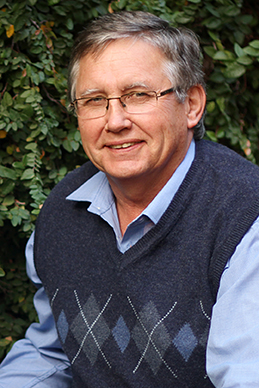Latest News Archive
Please select Category, Year, and then Month to display items
12 January 2024
|
Story Nonsindiswe Qwabe
|
Photo Sonia Small
 Since joining the UFS in 2008, Dr Grey Magaiza has worked extensively on approaches that can foster the socio-economic transformation of societies.
Since joining the UFS in 2008, Dr Grey Magaiza has worked extensively on approaches that can foster the socio-economic transformation of societies.
“The future should be one where communities can decide on their development agenda and futures. That’s the most important for me.” Dr Grey Magaiza, Deputy Director of the Centre for Gender and Africa Studies (CGAS) and Head of the Community Development programme on the Qwaqwa Campus, is passionate about capacitating communities to be agents of change and advancement. His vision for the future emphasises the empowerment of communities to take charge of their development by actively participating in decision making and the implementation of development projects that can improve their lives.
Since joining the UFS in 2008, Dr Magaiza has worked extensively on approaches that can foster the socio-economic transformation of societies. Over the years, he has crafted his research speciality into one that he is most proud of – being an interdisciplinary scientist immersed in the development of communities.
“I’m in a fortunate position of researching what I like. I say ‘fortunate’, because I’ve taken the time to understand what I’m passionate about, which is the overall field of rural livelihoods and livelihood futures – in short, community development. My research starts from an engaged university, understanding the elements that a university must use to enhance transformation and relevance to its immediate community in terms of development.”
One of the ways he has done this is by looking at social entrepreneurship as a development approach for young people in a rural setting. Through workshops with non-profit and civic organisations in Qwaqwa, Dr Magaiza has been helping these organisations to map out their needs and actively meet them through the involvement and support of external role players.
“We understand that communities are part of the national development agenda, but even that national agenda respects community knowledge and intentions and allows communities to shape their identity. A critical enabler of this is community organising. You bring back the capacity in communities to have dialogues on issues affecting them as spaces for engagement, knowledge exchange, and for people to just talk about their way forward.”
By enabling communities to define their development agenda, they can address their specific needs, challenges, and aspirations, he said. “When I look at livelihood futures, it’s quite an exciting aspect of my work – it’s like looking into a fortune tellers’ globe, because you’re not deciding for communities what they should do, but the communities themselves take those decisions.”
Prof Danie Vermeulen appointed as dean of the Faculty of Natural and Agricultural Sciences
2016-03-18

As the new dean of the UFS Faculty of Natural and Agricultural Sciences, Prof Danie Vermeulen is resolute to place this faculty on the world map.
Photo: Anja Aucamp |
The Council of the University of the Free State (UFS) approved the appointment of Prof Danie Vermeulen as dean of the Faculty of Natural and Agricultural Sciences during its meeting on 11 March 2016.
“Prof Vermeulen brings to the position of dean a set of formidable research and leadership achievements and a track-record of commitment to equity and diversity in the sciences," said Prof Jonathan Jansen, Vice-Chancellor and Rector of the UFS.
“It is a great honour that was bestowed on me to lead the faculty and it makes me feel very humble," said Prof Vermeulen.
Fifteen years ago, Prof Vermeulen joined the UFS as a researcher and lecturer. From 2007-2009 he filled the role of acting director of the UFS Institute for Groundwater Studies to subsequently be appointed as not only the director of this institute, but also associate Professor in Geohydrology.
As an alumnus, Prof Vermeulen has strong ties to the UFS. He acquired a BSc Honours, MSc, and PhD Cum Laude in Geohydrology here.This pursuit of excellence also transpires in his aspirations for the faculty’s future. “My vision is that the faculty becomes the best in South Africa in various departments – and recognised throughout Africa, especially in the applied sciences. In addition, the faculty will actively interact with world-leading universities, particularly in the hard sciences.”
Prof Vermeulen is a member of the Executive Committee of the Free State branch of the Groundwater Division of South Africa, member of the Executive Council of the International Mine Water Association, as well as council member at the Fossil Fuel Foundation of South Africa. In the past, he has held membership at the International Association of Hydrogeologists, South African Council for Natural Scientific Professions, Ground Water Division of the Geological Society of South Africa, Water Institute of South Africa, FETWATER Groundwater Initiative, and Editorial Board member of the scientific journal, Water SA.
Prof Vermeulen served as the acting dean for six months prior to his appointment. His appointment commences on 1 April 2016 for a period of five year.